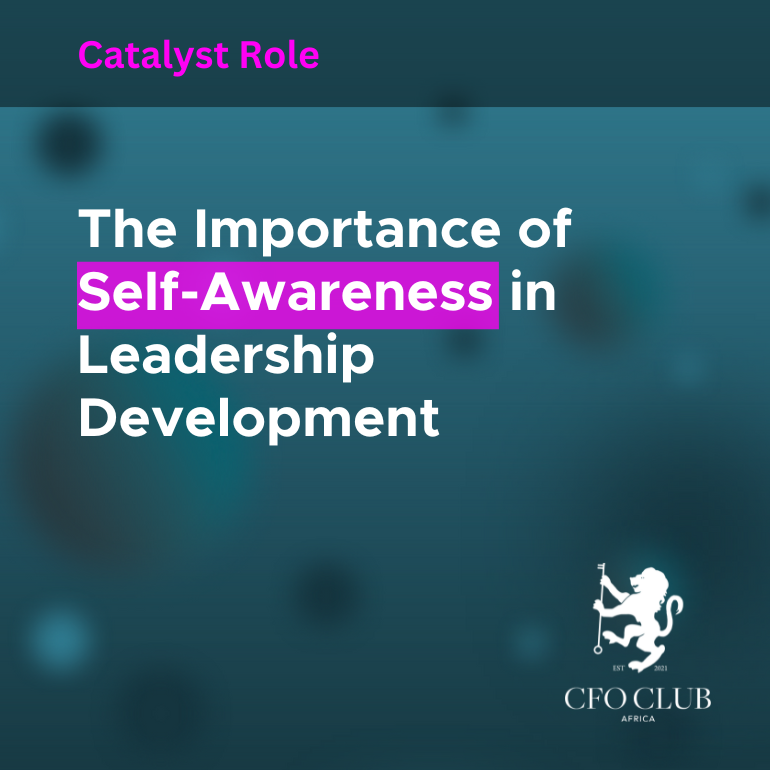The Importance of Self-Awareness in Leadership Development
As a CFO, your role extends beyond managing finances; you are a key leader within your organisation. Leadership isn’t just about guiding your team or making strategic decisions; it’s also about understanding yourself. One of the most crucial, yet often overlooked, skills in leadership development is self-awareness. Self-awareness allows you to understand your behavior, recognise your emotional triggers, and see how your actions impact others. This article explores why self-awareness is essential for leadership development and offers practical tools and strategies to enhance this vital skill.
What is Self-Awareness?
Self-awareness is the ability to see yourself clearly and objectively through reflection and introspection. It involves being mindful of your emotions, motivations, and behavior, and understanding how these factors affect your decisions and those around you. For CFOs, self-awareness is particularly important because it helps you:
- Make better decisions: By recognising your biases and blind spots, you can approach problems with a more balanced and clear perspective.
- Build stronger relationships: Understanding your communication style and emotional triggers helps you connect more effectively with your team and stakeholders.
- Adapt to change: A self-aware leader can quickly adjust their approach when faced with new challenges.
Why Self-Awareness Matters for CFOs
1. Improves Decision-Making Quality
CFOs are constantly making decisions that affect their company’s financial health. Self-awareness helps you recognise when personal biases or stress might influence your judgment. For example, if you tend to be risk-averse, being aware of this can help you counterbalance your decisions with more objective data analysis instead of relying solely on instinct.
2. Enhances Emotional Intelligence
Emotional intelligence (EQ) is the ability to understand and manage your emotions and those of others. A self-aware CFO can handle difficult conversations, provide constructive feedback, and remain calm under pressure. This is crucial in high-stress environments where your emotional response sets the tone for your team.
3. Fosters a Growth Mindset
Leaders who are self-aware are open to feedback and willing to learn from their mistakes, fostering a growth mindset. This mindset encourages continuous learning and adaptability, allowing you to keep pace with a rapidly changing business environment.
4. Builds Trust and Credibility
Your team looks up to you not just for your financial expertise but also for your leadership. Self-awareness helps you show up authentically. When your team sees that you are conscious of your strengths and areas for improvement, they are more likely to trust and follow you, especially during challenging times.
Practical Ways to Develop Self-Awareness
1. Leverage Self-Assessment Tools
Two highly effective tools for developing self-awareness are the Johari Window and the Myers-Briggs Type Indicator (MBTI). These tools offer valuable insights into your personality, behavior, and leadership style.
- Johari Window
The Johari Window is a model that helps you understand the relationship between what you know about yourself and what others know about you. It consists of four quadrants:
- Open Area: Traits known to both you and others, such as your strengths and behaviors.
- Blind Spot: Traits others see in you, but you are unaware of, like appearing unapproachable.
- Hidden Area: Aspects you know about yourself but keep hidden, such as personal fears.
- Unknown Area: Traits that neither you nor others are aware of, often revealed through new experiences.
Value of the Johari Window: This tool helps you reduce blind spots through feedback and encourages more open communication, building a transparent work environment. For CFOs, it provides a clearer view of how your leadership style affects your team.
- Myers-Briggs Type Indicator (MBTI)
The MBTI is a personality assessment that categorizes individuals into 16 personality types based on preferences in four areas:
- Extraversion (E) vs. Introversion (I): How you gain energy—from social interaction or solitary activities.
- Sensing (S) vs. Intuition (N): How you process information—through concrete facts or abstract ideas.
- Thinking (T) vs. Feeling (F): How you make decisions—logically or based on values.
- Judging (J) vs. Perceiving (P): How you approach life—structured or adaptable.
Benefits of MBTI: Understanding your type can help you recognise your decision-making style, communication preferences, and stress responses. This knowledge can improve team dynamics and guide personal development, helping you adapt your leadership approach to different situations.
2. Seek Regular Feedback
Actively seek feedback from your team, peers, and supervisors about your leadership style. Encouraging a feedback culture helps you gain a broader perspective of how you are perceived and identifies areas for improvement that you may not have noticed.
3. Reflect on Your Decisions
Set aside time regularly to reflect on your decisions and interactions. Ask yourself what went well and what could have been handled differently. Journaling these reflections can help you identify patterns in your behavior and make more informed decisions in the future.
4. Identify Your Triggers
Recognising your emotional triggers—such as specific comments or stressful situations—allows you to manage your reactions better. Developing strategies to handle these triggers can help you maintain composure and make measured responses.
5. Practice Mindfulness
Mindfulness practices, like meditation or focused breathing, can help you stay present and aware of your emotions. These techniques enable you to pause before reacting, enhancing your decision-making process.
Conclusion
Self-awareness is not just a soft skill; it’s a cornerstone of effective leadership, especially for CFOs navigating complex financial and strategic landscapes. By cultivating self-awareness, you can improve decision-making, strengthen relationships, and create a culture of continuous growth within your team. Start applying these practical tips, and you will not only enhance your leadership abilities but also inspire those around you to reach their potential.
Remember, true leadership begins with knowing yourself. The better you understand your strengths, weaknesses, and impact on others, the more effectively you can lead.

